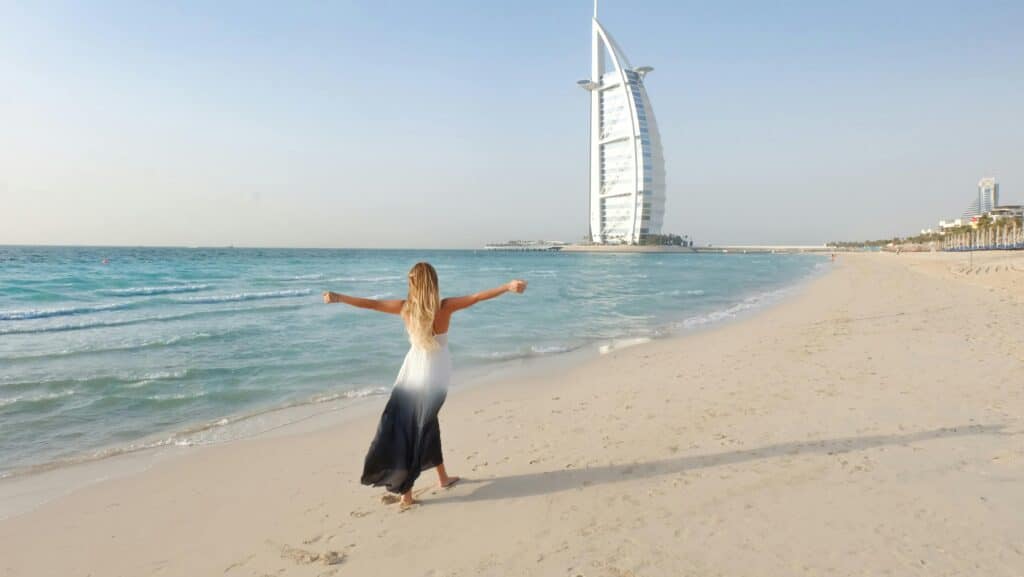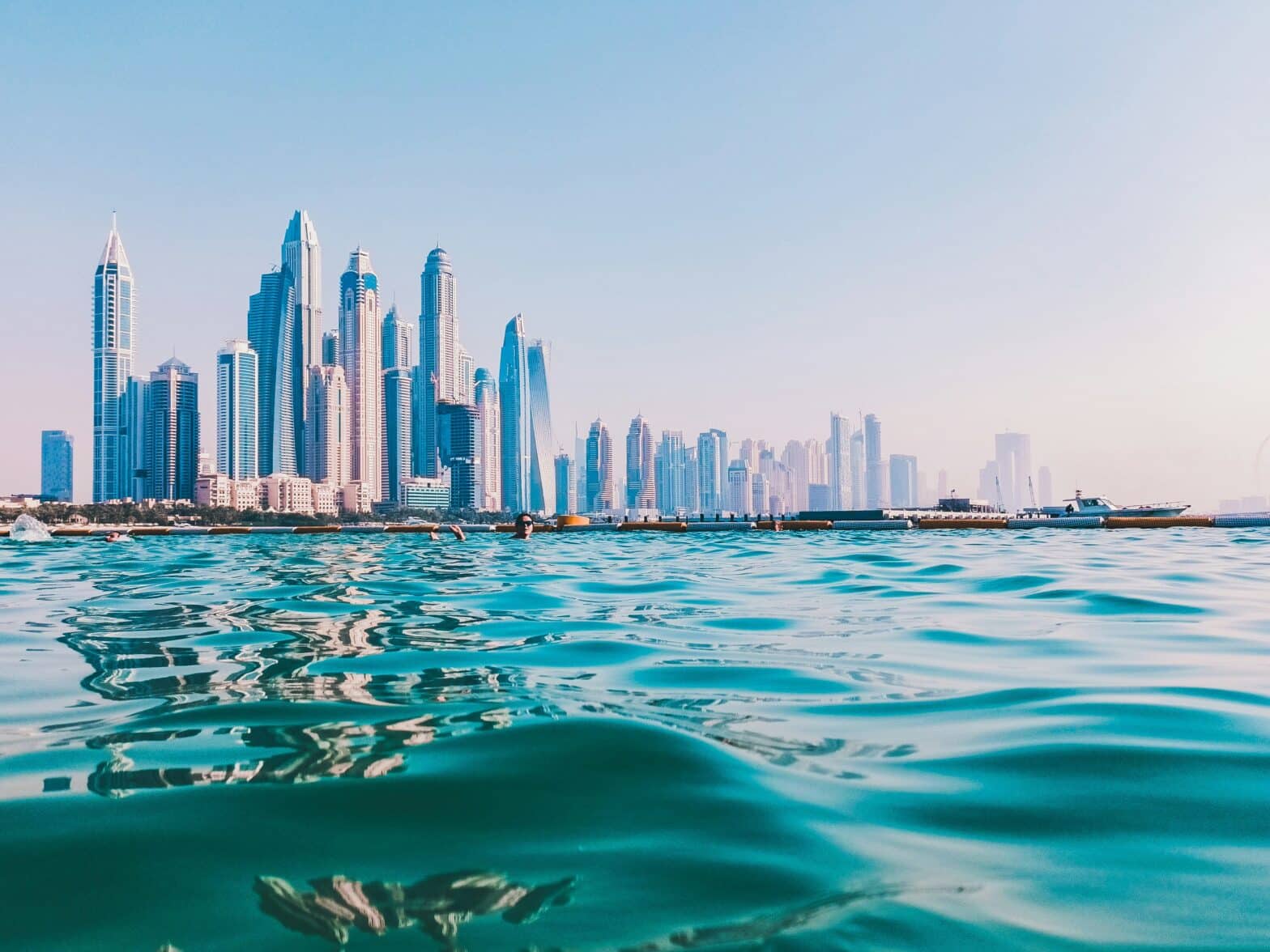Dubai is the dream venue of almost 90% of expatriates in search of the exotic and opulent. Renowned for its extravaganzas, the glittering emirate is one of the most expensive cities in the Middle East. It was recently ranked the 18th most expensive city in the world. From education through transport and the basics, Foyer Global Health helps you plan for how best to anticipate and manage the cost of living in Dubai as an expatriate in the United Arab Emirates.
A reminder: the official currency
The currency used in Dubai is the UAE Dirham (AED). As of April 17, 2024, 1 AED = 0.26 EUR. For an approximate calculation, simply divide a sum in AED by 4, or multiply a sum in euros by 4. One dirham is divided into 100 fils.
Cost of living: Numbeo comparisons between Dubai and other countries
Dubai versus USA (New York)
While consumer prices in Dubai are 40.2% lower than in New York, rental prices in Dubai are 50.9% lower than in New York. While local purchasing power in Dubai is 26.1% higher than in New York, groceries prices in Dubai are 54.8% lower than in New York.
Dubai versus Geneva (Switzerland)
Consumer prices including rent in Dubai are 30.4% lower than in Geneva, and grocery prices in Dubai are 57.5% lower. Local purchasing power in Dubai is 9.9% lower than in Switzerland as a whole.
Dubai versus Montreal (Canada)
Consumer prices including rent in Dubai are 23.9% higher than in Montreal, and rental prices in Dubai are 80.1% higher than in Quebec city. While grocery prices in Dubai are 30.5% lower, local purchasing power in Dubai is 21.5% higher than in Montreal.
Total cost of living in Dubai
According to Numbeo, a family of four needs a monthly budget of AED 14,225.5, excluding rent, and a single person needs a monthly budget of AED 1,044.1, excluding rent. The average local salary is around AED 10,000, but this varies greatly depending on the sector of activity, and as an expatriate you may be able to negotiate an advantageous package with your employer.
How much does accommodation cost?
Rentals
In Dubai, rents and availability vary widely and there is accommodation to suit every budget. The average rent for a standard three-room apartment in the city centre is AED 15,367 per month, compared to AED 10,537 outside the city centre. In fact, the more amenities the apartment has like sports facilities, concierge services, security services, the higher the rent. In addition to the rent, you’ll also need to add other accommodation costs such as a deposit (5% for an unfurnished property; 10% for a furnished property), monthly community fees (5% of the annual rent divided by 12) and water and electricity bills (between AED 400 and AED 4000 per month payable to the Dubai Electricity and Water Authority (DEWA), the local water and electricity supplier).
Purchase
If you’d prefer to buy a property in Dubai, it is imminently possible in certain areas such as Dubai Marina, Jumeirah Lake Towers and Palm Jumeirah. The average price for a studio apartment is the equivalent of 200,000 €; for three-bedroom apartments, prices start from 400,000 €, but prices can quickly escalate for the most luxurious apartments. In the city center, prices per square metre range from AED 8,200 to AED 35,000. In addition to the property price, you’ll also need to pay a NOC (No Objection Certificate) fee of between AED 500 and AED 5,000, a registration fee (approximately 4% of the total purchase price of the property) and an agency fee of 2% of the total purchase price of the property. The purchase of a property worth more than AED 2 million (approx. €500,0000) entitles you to a 10-year residence permit under a Golden Visa application.
How much does food cost?
As in other Middle Eastern countries, many food products are imported and therefore more expensive than in the USA or Europe. For example, a litre of milk costs on average AED 7.50 on average, a carton of 12 eggs AED 11.56 and 1 kg of potatoes AED 3.77. On the other hand, a bottle of water costs about the same as in Europe (less than 1 euro, but prices vary widely depending on the area: whether at the airport, store or outside the city centre.
Education in Dubai
Education is a major expense in Dubai. There are several private schools (international and French), with fees varying according to type and reputation. For example, at the Swiss International Scientific School in Dubai, fees range from AED 64,359 to AED 102,739. The average annual fee for an international school is over 9,200 € per year per child. In addition to annual tuition, there are registration and application fees for the first enrolment, as well as school transport, meals, uniforms and extra-curricular activities (school generally ends at 1 p.m.). Ask your employer about the possibility of covering part of the school fees through a package linked to your contract.
Medical services
Dubai’s public and private health establishments offer excellent health services, thanks to ultra-modern medical equipment, top-notch healthcare and highly qualified medical staff. This excellence comes at a price. For example, a consultation with a general practitioner costs between €50 and €100. You should be aware that your employer is obliged to provide you with basic medical insurance, which is often included in the salary package. Nevertheless, it’s best to take out an international health insurance policy for Dubai, which covers you flexibly and efficiently wherever you choose to resettle. Contact our experts for rates on our various coverage options.
Domestic help
In Dubai, it’s common to hire staff for housework and childcare, as they are particularly affordable. On average, you’ll need to spend between AED 35 and AED 40 per hour for housework, between AED 2,500 and AED 4,000 per month for a live-in nanny and AED 1,000 per month for a live-out nanny.
Telecommunications
Telecommunications services are generally more expensive than in Europe. Virgin, Etisalat and Du are the three main operators on the market. Home internet packages cost on average around AED 350 per month and mobile packages around AED 220.96.
Getting around Dubai
The preferred means of getting around Dubai is by car. It’s possible to rent a family car for around AED 3,000 per month. Or, if you prefer to buy your own vehicle, you can expect to pay an average of AED 83,766 for a city car such as a Toyota Corolla. As in most Gulf countries, petrol is quite cheap (around 0.75€/liter). However, some expats use taxis or the Careem app to get around. If you prefer to use public transport, a monthly pass costs on average AED 300.

Leisure activities
What is available for some leisure activities in Dubai and at what cost?
- A cinema ticket costs on average AED 50.
- A monthly gym subscription AED 330 and a tennis court rental AED 177.12.
- A visit to the Burj Khalifa Tower (floors 124, 125 and 148) costs between AED 400 and AED 548.
- A visit to the Dubai Opera AED 75
- A day at a beach club costs between AED 100 and AED 250 during the week and up to AED 350 at weekends.
